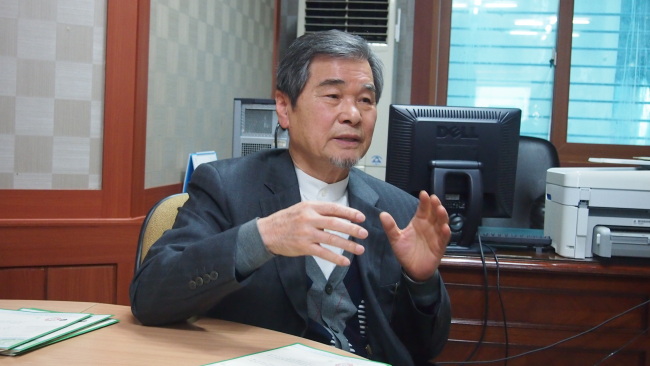When Lee Haeng-lae was introduced to Islam in the 1950s, his image of the religion was like most other people during that time: the Koran in one hand, and a sword in another. But after a trip to Malaysia, he realized that Muslims were not violent people and ultimately converted to the religion in the early 1960s.
Embracing Islam was not an easy task in a country where the religion has struggled for years against the perception that it is radical and violent.
“My father particularly flat-out said, ‘I don’t want you believing in Islam’,” said Lee, now an honorary Imam at the Seoul Central Mosque. “Even now, it’s not easy for Muslims to fit in. My granddaughter said some of her friends still have issues with her being a Muslim.”
 |
Lee Haeng-lae (The Korea Herald) |
Since his conversion, Lee has been leading efforts to set the record straight regarding Islam in Korea, which has been a tall order.
He pointed out that whenever a terrorist organization brandishing the word “Islam” was involved in an incident, the media focused on the Islamic. “In such organizations, their political purpose is their essence, not the religion,” he pointed out.
Also, the concept of “jihad,” which means “struggle” or “resisting,” has constantly been misinterpreted, he said. The word is often translated as “Holy War,” giving the impression that Islam and violence are connected.
“Jihad is very different from its current political use. It is more related to religious struggle, fighting oneself to repel evil and not the act of violence itself,” Lee explained in an interview.
Despite his efforts, he was confronted by such prejudices in 2007, when the militant group Taliban in Afghanistan took 23 Koreans ― including 19 volunteers from a local Christian church ― as hostages. At the time, he brokered with the Taliban in Afghanistan for the release of the Koreans.
“It was the Ramadan period ― a time of tolerance. I asked to show tolerance and (a high-ranking Taliban official) replied, ‘It is against Afghan traditions to send off important guests empty-handed,’” Lee remembered. “That was an implication that they would release the hostages.”
But after the incident ended in the death of two hostages, anti-Islamic sentiment spread in Korea. Lee said the reaction ― while misdirected ― was understandable.
“Of course, (people) would be infuriated by such inhumane acts. Although our religious group has no ties with such organizations, we’re accessible to protesters, thus their anger naturally is targeted toward us,” he said.
Lee continues to promote what he says are the true virtues of Islam, and holds conversations with believers, visitors and anyone interested in the religion.
“The essence of Islam is to live a proper life while carrying out good deeds. Understanding that is the key to understanding Islam,” he said.
By Yoon Min-sik (
minsikyoon@heraldcorp.com)
Kim Yu-ah contributed to this article. ― Ed.








![[Weekender] Korea's traditional sauce culture gains global recognition](http://res.heraldm.com/phpwas/restmb_idxmake.php?idx=644&simg=/content/image/2024/11/21/20241121050153_0.jpg)